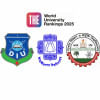Why university rankings should matter

When the University of Zurich announced its withdrawal from the international university ranking published by Times Higher Education (THE) in March 2024, many in Bangladesh supported the decision and called for Bangladeshi universities to do the same. This opinion quickly went viral across social media. However, did these people consider the various factors the Swiss university evaluated before making its decision, or were they content to simply note that the university had withdrawn from the ranking?
The University of Zurich boasts enviable metrics, such as its number of research citations, employment outcomes, and academic environment. Additionally, the university, which is over 191 years old and has produced 12 Nobel laureates, including Albert Einstein, has established a certain standard of excellence. Given these, it becomes clear that even without participating in any ranking platform, the University of Zurich would continue to provide high quality education and create ethical research.
While the Swiss university can afford to ignore such rankings, Bangladeshi universities do not yet enjoy such privileges. The challenges faced by educational institutions in the country extend beyond academic issues, encompassing, as Dr Sazzad Siddiqui noted in an article, "excessive politicisation, opportunistic academic practices, parasitic clientelism, and restricted freedom of speech." Moreover, both the regulatory bodies overseeing education in Bangladesh and the internal authorities of the universities seem hesitant to address many academic policies.
There are also those who have, as Prof Shamsad Mortuza describes, a "love-hate relationship" with university rankings. "We love university rankings, especially when our names grace the list. Without this recognition, we'd easily find 10 reasons to criticise the process." Such an attitude suggests that rankings are not viewed as imperative.
Nevertheless, participation in ranking platforms has brought positive social pressure to Bangladeshi universities and society as a whole. Thus, rankings are essential for improving university standards. While Sarah Amsler argues that "the practice of ranking is an act of symbolic violence and a mechanism of social exclusion," it still appears to drive improvements in institutional practices.
Some argue that universities should focus on ensuring quality education rather than pursuing good rankings. But who will verify if they are providing quality education? Most of these reputable platforms are data-driven, even though they may lack what Dr Siddiqui calls a "context-sensitive approach." Still, rankings can expose a university's weaknesses and help it to address them. It seems, then, that ensuring quality education and pursuing rankings can go hand-in-hand.
Bangladeshi universities in general are primarily teaching institutions rather than research-oriented ones. This teaching-focused nature is likely one reason why Bangladeshi universities do not rank highly in international rankings. However, change is on the horizon. The number of courses faculties teach is reducing, and the class size is becoming smaller, allowing faculties to conduct research and pay better attention to students. While some may question the quality of this research, it's worth noting that publications in indexed journals are favoured, not those in dubious outlets. Top researchers are rewarded, and universities, especially private ones, often cover the article processing charges (APC) for open-access journals, which can be quite expensive, sometimes ranging from $100 to over $5,000.
It's also important to consider that the heavy assessment load in Bangladesh's academia—quizzes, sit-down tests, reports, viva voces, etc—is often a nightmare for faculty. However, the positive pressure from international ranking platforms seems to be shifting the focus in academia towards quality rather than quantity. Although some stakeholders prioritise revenue generation, a balance between quality and revenue is becoming more evident, particularly at private universities.
Those who have studied abroad are well aware of the benefits of interacting with both faculty and peers from diverse backgrounds. International campuses are quite diverse. However, the number of international students in Bangladeshi universities—or international faculty members—is quite small. Hopefully, this will change in the near future as rankings emphasise internationalisation. A diverse campus can enrich understanding, broaden horizons, and promote open-mindedness among everyone.
Ranking platforms also encourage inclusivity and respect for diverse opinions and lifestyles. As universities are the torchbearers of any nation, they should be the first ones to ensure progress. Whether today or tomorrow, an inclusive society will become a reality, regardless of attempts to prevent it. The responsibility now lies with the universities; they must decide whether they want to stay ahead of the curve and climb the ranking ladder today or remain silent during a time of revolution in academia.
While no ranking platform is entirely comprehensive or flawless, it is better to participate in reliable ones. Thanks to the ongoing criticism and feedback, these platforms have continued to evolve. Although rankings are not immune to flaws or criticism, it's best to accept them in relative terms. The ranking platforms frequently revise their criteria, indicating their own evolution. This pressure from various quarters helps ensure that things stay in check. Instead of dismissing rankings outright, we can work to improve them—or even create new ones to address specific needs.
M Shakhaowat Hossain is director-in-charge of the Institutional Ranking Cell and senior lecturer of English literature at North South University (NSU).
Views expressed in this article are the author's own.
Follow The Daily Star Opinion on Facebook for the latest opinions, commentaries and analyses by experts and professionals. To contribute your article or letter to The Daily Star Opinion, see our guidelines for submission.

 For all latest news, follow The Daily Star's Google News channel.
For all latest news, follow The Daily Star's Google News channel. 








Comments